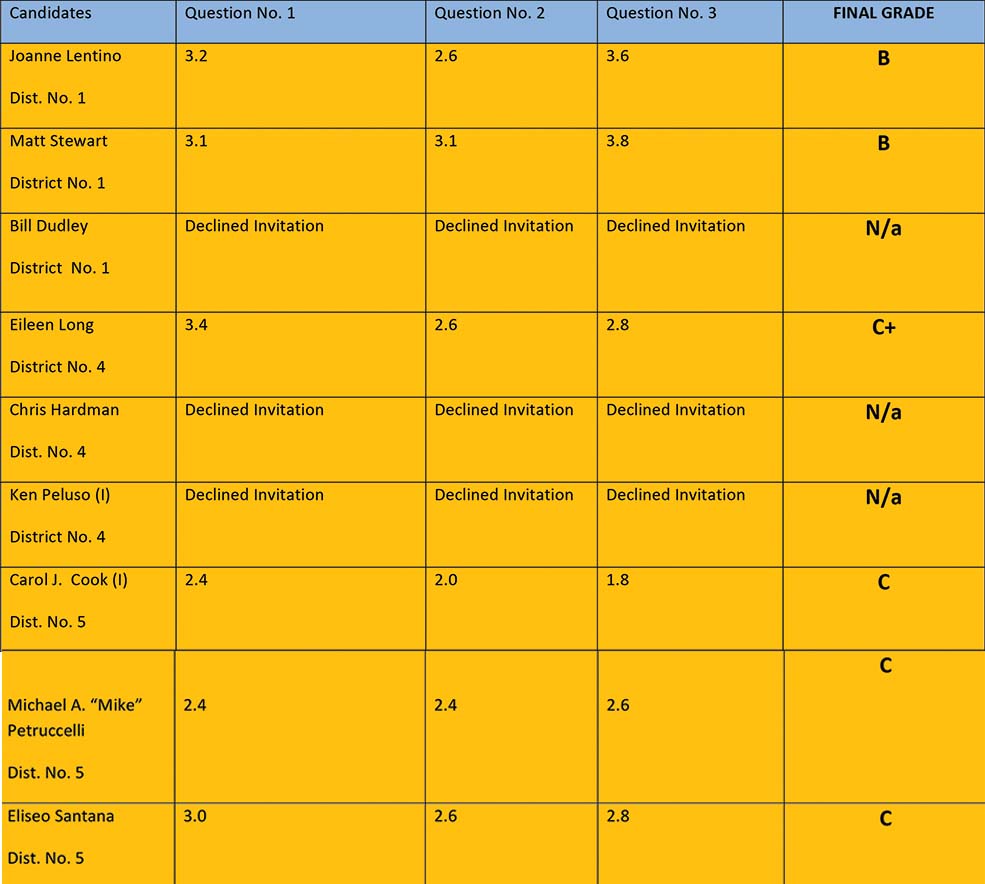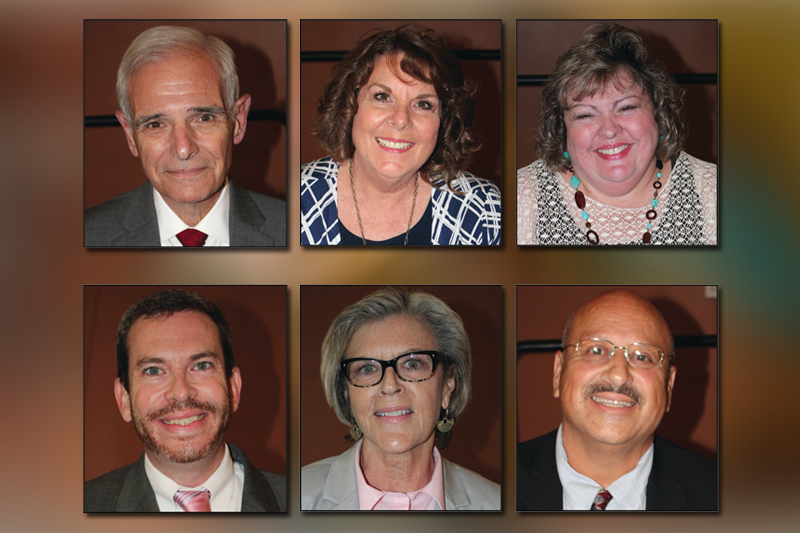BY FRANK DROUZAS, Staff Writer
ST. PETERSBURG –Candidates vying for three seats on the Pinellas County School Board attended a forum hosted in partnership with the St. Petersburg branch of the NAACP at St. Petersburg College’s Allstate Center. Moderated by WTSP Channel 10 news anchor Reginald Roundtree, the forum was held June 21.
Candidates that accepted the invitation included, District 1 at-large candidates Joanne Lentino, a retired first-grade teacher at Gulfport Elementary; Matt Stewart, a deputy director for Hillsborough County Supervisor of Elections and adjunct ethics professor at St. Petersburg College; District 4 candidate and Clearwater Intermediate science teacher Eileen Long; District 5 incumbent Carol Cook; Mike Petruccelli, a licensed real estate and insurance broker from Indian Shores; and Eliseo Santana Jr., a retired communications maintenance supervisor at the Pinellas County Sheriff’s Office.
District 5 incumbent Ken Peluso, District 1 candidate, former St. Petersburg City Councilmember Bill Dudley and District 4 candidate and longtime Pinellas teacher Chris Hardman did not attend.
The candidates addressed a variety of pertinent issues, including what needs to be done to more directly involve parents and promote direct and open lines of communication with them.

NAACP Report Card for Candidates
Long, who has 33 years of teaching experience, said she believes it starts at the very top.
“We as a school system have become more reactive than proactive,” Long said, adding that school stakeholders should be made to feel comfortable in coming into the school system. “We need to start to bring back our surveys. We should not be afraid of our surveys. How is the superintendent and his support doing? How is the school board doing? How are school-based administrations? They get their marching orders from the top. That’s where they get their empowerment.”
Santana said that though he believes parental participation is a must, he added that it is tougher for some parents—notably single parents or parents of low-income households—to have the necessary resources such as transportation or computers that would allow them to connect the child’s school and teachers.
Lentino said she envisions our schools as a community—an engaging environment that makes parents feel welcome.
“There’s no reason why we shouldn’t have more diversity in our schools,” she said, “in order to make the people of the neighborhood feel more welcome.”
She added that if sensitivity training is necessary, then that’s what needs to be done.
Incumbent Cook agreed that schools need to promote a welcoming environment.
“Part of what we are doing is going into the communities and making sure we’re talking with families,” she said.
Petruccelli said there should be a “free flow” of communications at all levels.
“We need to flatten the fat organizational structure,” he said, “We need to get more nimble and flexible to respond to the children’s needs. I want to put the children in their place, and that’s first place.”
Stewart said that new technologies that parents can use must be instituted, pointing out that nationally African-American households have the “lowest access” to computers. He also stressed the importance of knowing where parents gather out in the community, be it houses of worship or parks, so locations of meetings can vary and the parents will not always be required to come to the schools. Meetings must also be held at convenient times for parents and must be well advertised, he said.
As for the question of recommending any relevant policy changes if elected, Lentino said it’s not one “blanket fix” that is going to help children succeed. The needs of the various individual children do need to be met, she said, whether it is through social workers, anger management or additional academic step-up classes.
“We have to look at the issue of poverty,” she said. “Poverty has increased and education has decreased. And until we come to accept the needs of the child in poverty, we’re not going to able to move that bar up.”
Stewart promotes an extended school day, with focus on such areas as literacy and math, and the involvement of mentors.
“We also need to look at what I call ‘wrap-around services,’” he said, noting the need to address certain individual issues such as a student coming to school hungry or without clean clothes.
Long stated that teachers need to be allowed to develop a bond with their students, and not have to look over their shoulders, worrying about their jobs.
Cook said that to help close the achievement gap there are mentors already in place, and the school board is looking into getting iPads into homes and buses with Wi-Fi capability to park them outside homes to make internet access available.
Candidates also addressed the issue that the failing schools of Pinellas are lacking diversity.
“It’s not so much that we have diversity in the neighborhoods we’re in,” Santana explained, “it’s that we need to have the teaching staff equipped properly and supported.”
Petruccelli stated that there are a number of young college students of various ethnic backgrounds that want to teach, and they should be recruited.
On the issue of educational budgets, Stewart said that he worried about solutions that are only money-based. Though funds could certainly help with a number of things such as wages and technology, it cannot solve all the problems.
Cook said one of the bigger issues is that the money comes “with strings attached,” including mandates on how to spend allotted funds. But though money helps, it is more important to have teachers that can get students engaged in their education, she said.
“I don’t believe, like the sharecropper, we need to go and ask the state to give us more money,” Petruccelli affirmed. “I believe that we—these people—need to be ambassadors to the business community with a story of why it is good business for corporate America to invest with our state money in providing the services we need for our students.”
Santana denounced the way that the state mandates funds be spent by the schools, sometimes preventing schools from being able to use the money in the “wisest way.”
“I’d rather not have a dollar from them,” he stated firmly, “if that dollar requires me to spend it in a way that doesn’t make sense.” He added that it’s not necessarily the money or lack of money, but the state-imposed mandates.
“We need to work on getting rid of that mandate,” he said. “We need to have a board that has the ability of being able to use that money more wisely.”
President of the St. Petersburg Branch of the NAACP Maria L. Scruggs ended the forum by telling the candidates in front of a packed house that they will be watched.
“We know that this a tough job and we know it’s going to take some great people to lead this work. The one message that I want to make sure that is left with whoever shall prevail is that the NAACP is going to be here to hold you all accountable,” she concluded.
To reach Frank Drouzas, email fdrouzas@theweeklychallenger.com
Post Views:
28,113

